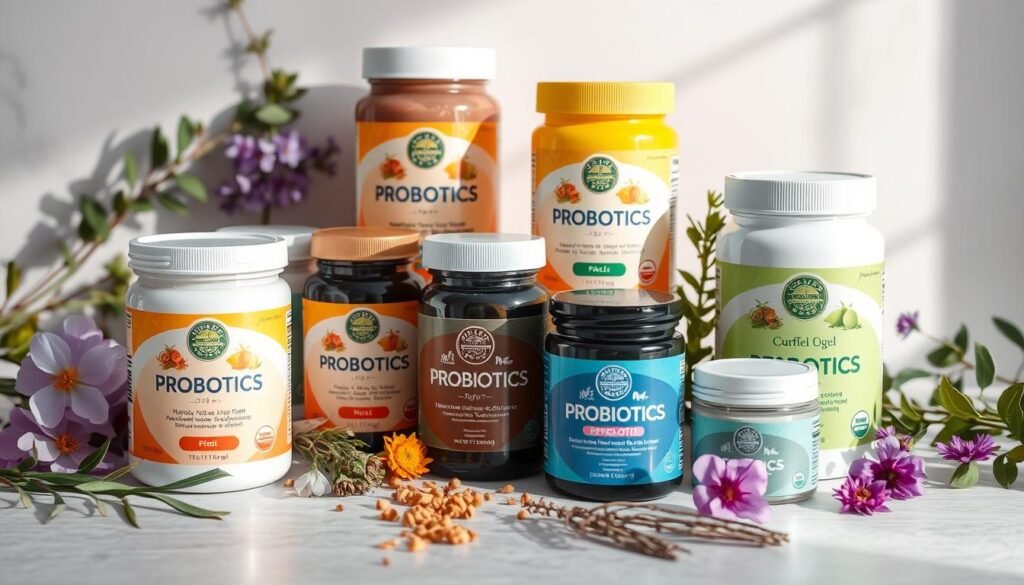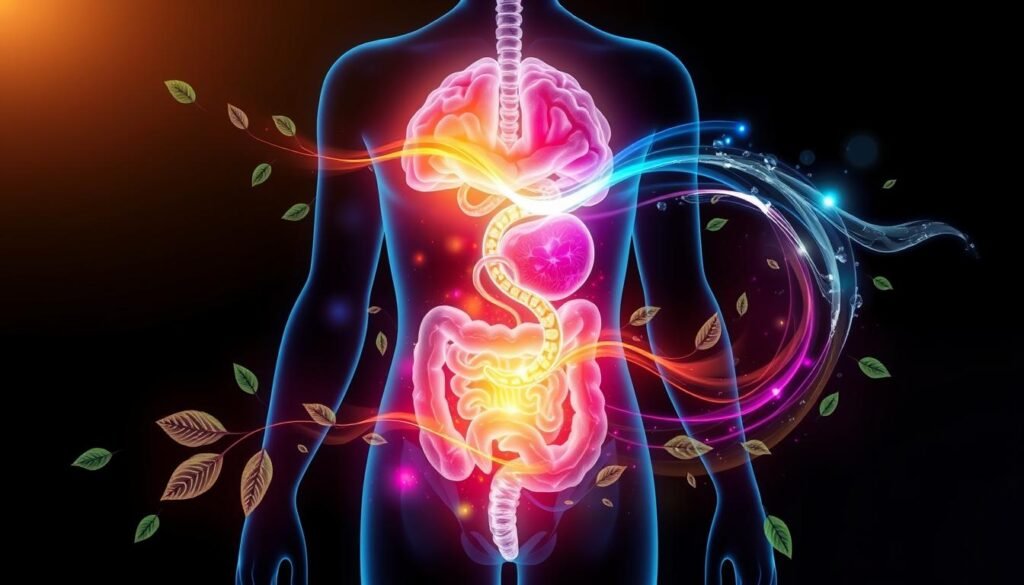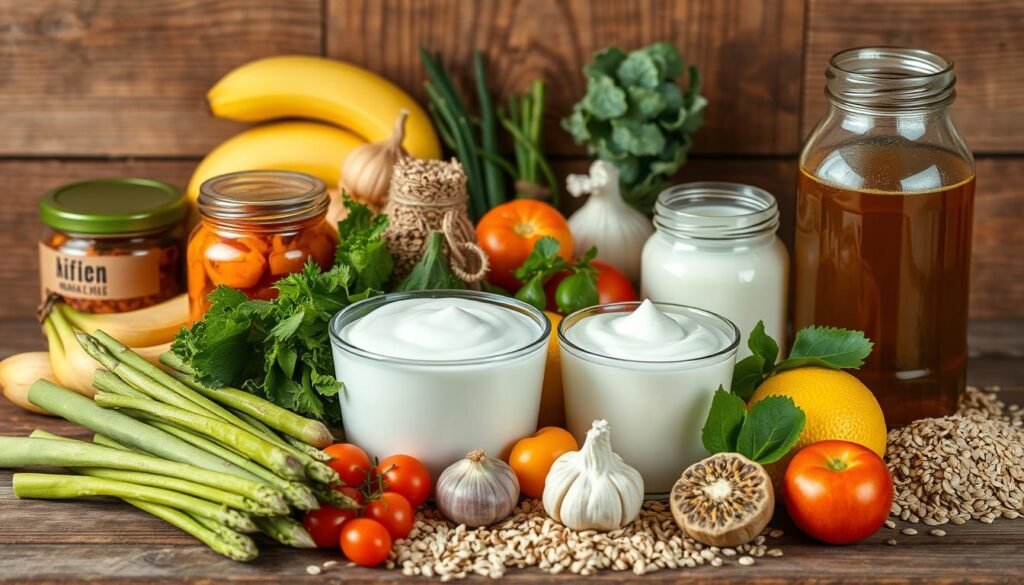Did you know nearly 30% of U.S. adults might face an anxiety disorder during their life? The push for understanding mental health better is growing. And with it, the interest in natural ways to help, like probiotics for anxiety. Studies show a strong link between our gut health and our mental state. This suggests a healthy gut can help ease anxiety symptoms. This article will explore how improving gut health with probiotics can be a natural way to feel better, offering an alternative to traditional mental health treatments.
Key Takeaways
- 30% of adults in the U.S. experience anxiety disorders.
- Probiotics can positively affect gut health and mental well-being.
- A healthy gut microbiome can significantly reduce anxiety symptoms.
- Multi-species combinations, like Lactobacillus and Bifidobacterium, are commonly studied for anxiety relief.
- Research supports the potential effectiveness of probiotics in managing stress and anxiety.
- Dietary changes, including low-FODMAP diets, can enhance emotional health.
Understanding Probiotics and Their Role in Mental Health
Probiotics are key for gut health and can boost mental health. These good bacteria, when taken, have benefits beyond the gut. Often in yogurt and fermented veggies, and supplements, they keep the *healthy microbiome* well. This is vital for feeling good all around.
What are Probiotics?
Probiotics are good bacteria that help our digestive system work better. You can find them in foods like yogurt, kefir, and sauerkraut, and in pill form. Lactobacillus and Bifidobacterium are especially good for our minds. With 19.1% of adults in the US dealing with anxiety, it’s important to see how probiotics can help.
The Connection Between Gut Health and Mental Well-Being
There’s a strong link between our gut health and how we feel mentally. The gut-brain axis lets the gut and brain talk to each other. Studies show people with a *healthy microbiome* are more stable mood-wise. They face less anxiety and depression. In fact, people eating probiotics show better scores on depression tests. This makes it clear that a healthy gut supports a healthy mind.
| Aspect | Probiotics for Anxiety | Gut Health | Mental Health |
|---|---|---|---|
| Definition | Beneficial bacteria aiding health | Optimal functioning of digestive system | Overall psychological well-being |
| Common Strains | Lactobacillus, Bifidobacterium | N/A | N/A |
| Sources | Yogurt, supplements | Fermented foods, fiber-rich foods | N/A |
| Benefits | Improves mood, reduces anxiety | Supports digestion, boosts immunity | Enhances emotional stability |
The Gut-Brain Axis Explained
The gut-brain axis is a major link between the gut and the brain. It’s key for mental health and mood regulation. Changes in gut health can mess with signals sent to the brain. This can affect our anxiety levels and how we feel overall.
How Gut Health Influences Mood and Anxiety
Gut health can really affect our mood and anxiety. Gut microbes make important neurotransmitters like serotonin and GABA. These help control our emotions. A lot of serotonin, which helps with our mood, is made in the gut.
Short-chain fatty acids from gut microbes also play a role. They help the brain by supporting the blood-brain barrier and managing appetite.
The Science Behind the Gut-Brain Connection
The vagus nerve is a key part of the gut-brain connection. Stress can mess with signals traveling through this nerve. This can lead to stomach issues and affect the gut-brain link. Research also shows that a weak gut barrier might let harmful substances like LPS get into our blood. This can cause long-term inflammation linked to mental health problems.
This highlights how essential a healthy gut-brain relationship is for emotional stability. Probiotics, or “psychobiotics,” look promising in reducing anxiety. They help by fixing gut health and bettering gut-brain communication. For more details, check out this study.
Benefits of Probiotics for Anxiety
Probiotics are getting noticed for making mental health better, especially in lowering anxiety symptoms. Strains like Bifidobacterium longum and Lactobacillus helveticus are showing positive results. This suggests they could be helpful as anxiolytic probiotics. The link between a healthy gut and good mental health is an exciting find.
Reducing Anxiety Symptoms Through Gut Health
Research shows that probiotics have a big effect on our gut, which affects how we feel. They help make useful compounds that support our brain health. By keeping our gut balanced, probiotics play a key role in easing anxiety.
Evidence of Effectiveness in Research Studies
Many research studies back up the use of probiotics in managing anxiety. A meta-analysis and clinical trials both found that probiotics reduce anxiety levels. They lead to more good bacteria in our gut, like Bifidobacterium adolescentis and Fecalibacterium prausnitzii.
| Study Focus | Results | Probiotic Strains |
|---|---|---|
| Gut Microbiome Analysis | Lower Aitchison distance in probiotic users (P < 0.001) | Bifidobacterium longum |
| 12-Week Supplementation | Increased neuroactive metabolites | Lactobacillus helveticus |
| Diversity in Microbial Species | Significant decrease in Shannon diversity index in placebo (P < 0.05) | Bifidobacterium adolescentis |
Choosing the Best Probiotic for Anxiety
Finding the right probiotic for anxiety means knowing which ones truly help. It’s key to choose based on quality and the variety of strains. These aspects are crucial for improving mental health through gut health. It’s important to pick strains proven to reduce anxiety.
What to Look for in a Probiotic Supplement
There are key factors to consider when selecting probiotics for anxiety:
- Colony-Forming Units (CFUs): Aim for at least 1 billion CFUs per dose. For psychobiotics, look for products with no less than 100 million CFUs.
- Strain Quality: Choose strains like Lactobacillus, Bifidobacterium, Bacillus, or Saccharomyces boulardii. They are well-researched.
- Expiration Dates: Ensure the product hasn’t expired to maintain its effectiveness.
- Independent Testing: Pick probiotics tested by third parties for assured quality.
- Storage Recommendations: Proper storage is crucial as heat can kill the microorganisms.
Recommended Probiotic Strains for Mental Health
Some probiotic strains are specifically beneficial for mental health:
| Probiotic Strain | Benefits |
|---|---|
| Lactobacillus rhamnosus | Influences GABA receptors, helping to lower anxiety. |
| Bifidobacterium longum | Works as an antidepressant, can reduce cortisol related to anxiety. |
| Lactobacillus plantarum | Increases dopamine and reduces inflammation, which is tied to anxiety. |
| Bifidobacterium bifidum | Helps with gut balance, essential for managing anxiety. |
| Other Recommended Strains | Includes Bifidobacterium longum 1714, Lactobacillus acidophilus Rosell-52. |

Before taking any probiotic supplement, talking to a healthcare provider is wise, especially for those with existing health issues. The correct probiotics can greatly help in controlling anxiety.
Probiotics for Anxiety: Current Research and Findings
Recent studies highlight how probiotics might help reduce anxiety symptoms. It’s crucial to choose the right probiotic strains for this effect. Research now shows that not every probiotic works the same for mental health.
Notable Studies on Probiotic Efficacy
About 44% of studies show probiotics can lessen anxiety. These studies involved over 700 people in total. Strains like Lactobacillus acidophilus and Bifidobacterium breve were especially effective.
They significantly reduced anxiety. This was shown by a noticeable drop in anxiety scores among participants.
Comparing Probiotic Strains in Mental Health Research
Studies suggest that using a mix of probiotic strains might be more effective. This approach can lower inflammation markers in nearly 58% of cases studied. This reduction in inflammation could help improve mental health.
These results encourage more research into probiotics as a treatment for anxiety disorders.
For anxiety support, connect with local resources and communities. This resource on anxiety support offers more information.
Inflammation, Leaky Gut, and Anxiety
Leaky gut syndrome is key in linking inflammation to mental health issues. When the gut lining is damaged, harmful substances leak into the blood. This triggers inflammation. It can worsen mental health problems, like anxiety and depression. The typical Western diet, with lots of processed foods, can make this worse. It highlights how vital good gut health is for our mood.
Understanding Leaky Gut and Its Impact on Mental Health
An unhealthy gut can lead to a disturbed microbiome and increased gut permeability. This is often tied to leaky gut, which links to anxiety and mood issues. Bad diet, poor sleep, and stress worsen it. Probiotics are seen as a way to fix gut health. They help heal and reduce inflammation. The Mediterranean diet is also helpful in lowering physical inflammation and easing anxiety.
How Probiotics Can Help Heal the Gut Lining
Probiotics play a vital role in healing the gut. They restore the lining and lower inflammation. This helps keep the gut’s barrier strong, which is good for mental health and reduces anxiety. Studies show probiotics improve gut health and mental well-being. They tackle inflammation and boost gut health. This helps people manage anxiety better and supports their overall mental state.

| Diet Type | Inflammation Level | Mental Health Impact |
|---|---|---|
| Mediterranean Diet | Low | Reduced Anxiety Symptoms |
| Western Diet | High | Increased Anxiety Symptoms |
| Probiotic-Rich Diet | Moderate | Supportive of Mental Health |
Using Probiotic Supplements for Anxiety
Adding probiotic supplements to your day can help manage anxiety. It’s key to find the right dosage recommendations. The best dose usually falls between 1 to 10 billion CFUs. Taking probiotics with your meal can improve how well your body absorbs them.
Recommended Dosages and Timing
For those new to probiotic supplements, knowing the correct dosage is key. You might need to adjust the amount, but usually, 5 to 10 billion CFUs daily is good for mental health. Taking your supplement with food makes it easier to absorb and remember.
Integrating Probiotics into Daily Routines
Making probiotics a part of everyday life is easier when you pair them with regular habits. Here are ways to make it simple:
- Take probiotics at breakfast or lunch to align with meals, enhancing absorption.
- Use reminders on smartphones or sticky notes in kitchens to encourage regular intake.
- Combine probiotic supplements with vitamins or other daily medications to create a consistent routine.
To make probiotic supplements work for you, understanding their use is crucial. They can lessen anxiety and build positive habits. For more on how gut health affects mental health, check out this relevant resource.
| Probiotic Strain | Benefits for Anxiety | Recommended Dosage |
|---|---|---|
| Lactobacillus rhamnosus | Reduction of anxiety symptoms | 1-10 billion CFUs |
| Bifidobacterium longum | Enhancement of mood & gut health | 5-10 billion CFUs |
| Lactobacillus acidophilus | Support for mental clarity | 1-5 billion CFUs |
| Lactobacillus helveticus | Improvement of stress response | 1-10 billion CFUs |
Natural Food Sources of Probiotics
Adding natural foods with probiotics to your daily meals can greatly improve your gut health. These foods do more than just keep trends; they help with mental and physical health. Below, find a list of probiotic-rich foods and how to include them in your diet.
Foods High in Probiotic Content
- Yogurt: Probiotic yogurt helps with gut health, digestion, and may lower disease risk.
- Kefir: This fermented drink helps with digestion, bone health, and fighting infections.
- Sauerkraut: Full of fiber and antioxidants, sauerkraut boosts eye health and gut flora.
- Tempeh: Tempeh, made from fermented soybeans, helps absorb minerals and provides vitamin B12 for vegetarians.
- Kimchi: This spicy dish is loaded with vitamins and good bacteria, promoting digestive health.
- Miso: Packed with protein and probiotics, miso could help manage obesity and high blood pressure.
- Pickles: Fermented cucumbers are a great source of probiotics. Choose naturally fermented ones for live cultures.
- Buttermilk: Used in many Asian dishes, traditional buttermilk offers essential vitamins and minerals.
- Natto: High in protein and vitamin K2, natto supports bone health.
- Certain Cheeses: Cheeses like cheddar and gouda can be probiotic-rich if they contain “live cultures.”
Incorporating Probiotic Foods into Your Diet
It’s easy to add these probiotic foods to your meals. Here are some ideas:
- Make a yogurt parfait with fruits and nuts for breakfast.
- Use kefir in smoothies for a nutrient-rich, tasty drink.
- Add sauerkraut or kimchi to meals as side dishes.
- Put tempeh into stir-fries or salads for a tasty protein boost.
- Try miso in soups or salad dressings for a flavor twist.
Trying different natural probiotic foods can help keep your gut diverse and healthy. Including these foods in your diet boosts not just your gut but your overall health.

Potential Side Effects of Probiotics
It’s important to know about probiotics’ side effects if you’re thinking about using them. While they offer many benefits, some people might feel discomfort or unwanted effects at the start. Knowing what could happen helps you make better choices and improve your health.
What to Expect When Starting Probiotic Supplements
Common side effects you might see include:
- Gas and bloating
- Diarrhea, which is usually temporary
- Minor stomach pain or change in bowel habits
- Rare skin issues like rashes
These issues often go away after a few days or weeks. A good probiotic usually has beneficial bacteria like Bifidobacterium and Lactobacillus. It should have up to 10 billion CFUs daily. Be careful with doses over 20 billion CFUs, as they may cause anxiety and other side effects.
People with serious illnesses or weak immune systems might have a higher infection risk. Choosing the right probiotic is crucial for these individuals.
Consulting Healthcare Professionals
Asking a doctor’s advice is key before starting probiotics, especially if you have health problems. If you’re allergic to gluten or dairy, you might need a special type of probiotic. Talking to a healthcare provider helps customize your probiotic use. This can lessen the chance of bad side effects.
For further information on probiotics and their side effects, Healthline is a good place to look.
Using probiotics wisely can lead to better gut health and overall wellbeing. It can happen without the downside of negative side effects.
Conclusion
Probiotics play a key role in linking gut health to mental well-being. Anxiety and mood disorders touch millions in the U.S., hitting women hard. Probiotics offer a natural way to ease anxiety alongside other treatments. They seem to help with depression, but more research is needed on their effect on anxiety.
Many studies, including ones on gut bacteria and anxiety levels, show that probiotics might boost mental health. Eating foods high in prebiotics and probiotics helps create a healthier gut. This could lessen depression and anxiety feelings. For a well-rounded mental health plan, probiotics are worth considering.
New research shows probiotics might greatly improve mental health care. Always chat with a doctor before adding probiotics to your routine. As we learn more about the gut-brain link, probiotics look promising for treating anxiety and similar conditions. For deeper insight, check out this research article.